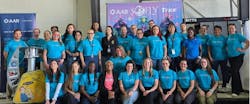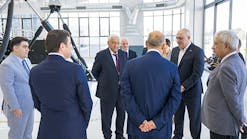The aviation industry is host to a wide variety of technically skilled and high paying jobs requiring not only a solid educational foundation, but also experience on the job. In a dynamic industry with a broad range of career paths, a mentor can be an invaluable resource to individuals beginning or building their careers. With a large number of aviation experts expected to retire within the near future, it is beneficial to young professionals to help them navigate their professional growth within the industry, and critical to the aviation community to develop a strong group of future leaders and experts.
I had the opportunity to participate as a panelist at the Airport Consultants Council (ACC) Annual Conference in a session that addressed the important role that mentoring plays in our careers and how mentoring is “making a difference for the next generation.”
Mentoring within an Organization vs. Mentoring within the Industry
When it comes to seeking out mentors, we need to look both inside our company and externally in the industry. Progressive companies are committed to offering a successful mentoring program within their organizations, as well as providing employees with additional mentoring and networking opportunities in the industry.
Roddy Boggus, who was employed with WSP Parsons Brinckerhoff at the time, explained that internal mentoring provides mentees with guidance on what the organization wants from them and what is expected professionally, so they can be professionally successful in their jobs. In contrast, he says, industry mentoring, or mentoring outside of a company, provides a dual benefit. “If you do well for yourself, you will be doing well for your employer.”
From the perspective of a young professional, I believe it is crucial to have mentors both within and outside your organization. Internal mentors have a vision for your corporate growth and they can provide insights on the corporate culture and opportunities for professional development and advancement. External mentors can offer a broader perspective, unbiased opinions and help establish a positive career path. They are in a better position to help you navigate internal corporate challenges that you’re not comfortable bringing up with internal mentors.
Both mentoring relationships are important to career growth and development, resulting is a well-rounded individual who can be successful in a variety of job situations and environments.
Finding a Mentor
Despite the importance of mentoring in skilled fields, it may be challenging to find the right mentor. The process can be organic through natural “on the job” interactions with colleagues, or it can be facilitated within companies and industry organizations. Both ways are valuable for mentor development and often result in a diverse range of opportunities for people new to this field.
Panelist Chris Spaulding, who worked for the Airport Consultants Council at the time, reinforced that personality characteristics play a major role in the mentorship relationship. “Overall, it can be a challenging process because everyone has a different personality type and they tend to approach situations and people in different ways. Many mentor relationships happen when you don’t expect it.”
As someone who has been with the same company - HNTB Corp. - for the duration of my career, I have been fortunate to experience both sides of the mentoring relationship and realize how much it has helped form the foundation of my career success at the company and in the industry. HNTB has a great track record of successful mentoring and the relationships that have been established are mutually rewarding. Even after a formal mentorship program ends, it is essential to maintain contact with former mentors because each person’s career continues to develop and future opportunities may arise that can be advantageous.
The Importance of Networking
The value of networking cannot be understated. Fortunately, there are many associations and organizations a new professional can be involved with to meet key industry professionals and influencers. According to Boggus, “The easiest way for mentors to help young professionals network in the aviation industry is to work with them, spend time and be willing to make introductions to colleagues at industry conferences, exhibit halls, networking mixers, socials and other key industry events.”
Networking can be a great entryway to find industry mentors. It’s a way to meet similar professionals, learn about them and their experiences, and share information about yourself. It affords the opportunity to hear about what’s going on in the industry and get a perspective that you might not find in the daily working environment. If you make a great connection with someone, it might lead to a future positive mentor/mentee relationship.
All panelists agreed that involvement in industry associations is a great way to network and potentially find a mentor. “Associations can create ‘the perfect storm’ for finding a good mentor as an environment that provides you access to other like-minded leaders in the industry,” added Spaulding. ACC’s Young Professionals Forum is a good first step and joining ACC committees is another great opportunity for young professionals.
The Path to Success
Many young professionals are eager to be successful, but don’t know where to start. Mentors can help them set reasonable goals and provide them with appropriate responsibilities. Development often requires being challenged to take on tasks or roles that offer growth and is the first step toward career and professional success.
Spaulding says that patience is key, and a good way for mentees to learn is for mentors to share their own experiences and help set realistic goals. Boggus believes in working with the individual to create a path toward measurable goals so success can be seen at every step.
It’s essential for mentees to establish long-term career goals that they can share with their mentor, enabling them to work productively together to achieve success. Mentorship starts with getting to know each other – teaching and learning will follow.
Key Learnings
As I look back on my professional career, I have learned valuable lessons from my mentoring relationships. I’ve had great opportunities in my career, but early on I did not take the time to set my long-term goals and outline ways to achieve them. I learned that new professionals should start planning and shaping their career from the beginning to achieve a rewarding career and professional success. It’s imperative to take time to reflect on where you want your career to take you and I encourage all professionals to shape their career instead of allowing their career to “happen” to them.
Throughout the spirited discussion, a few key themes emerged. First, mentorships are for everyone. No one is ever too old to be mentored, because there is always more to learn. The least intelligent person in the room is the one who thinks they already know all there is to know. Even successful professionals need guidance, advice and counsel, or a different perspective to help them become better leaders and collaborative team members. A good mentoring connection generally starts with personalities that mesh, and evolves into a mutually beneficial relationship based on trust and investment by both members. Lastly, it is a good strategy to have more than one mentor and the concept of a ‘panel’ of mentors or advisors, was eye opening. Professor Randy Berg said, “I tell my students to develop their own board of directors…choose three or four people that you really trust and turn to them when making big decisions.”
This group of trusted advisors is something that I’ve been cultivating over the years without necessarily thinking about it. I now plan on making a conscious effort to maintain my ‘board of directors’ as my mentor relationships evolve and encourage all professionals to do the same.
In conclusion, moderator Kristin Shaw summed it up beautifully for the audience: “Mentoring doesn’t always involve just one person but a collection of knowledge passed down from experienced people in the industry.” Mentors are an essential part of every successful career.
Jennie Santoro, NCARB, AIA, serves as project architect for HNTB Corp. She is a licensed architect in California, member of Airport Consultants Council Young Professionals Forum, mentor with ACE Mentor Program for high school students and mentor with AIA Los Angeles. Contact her at [email protected].







